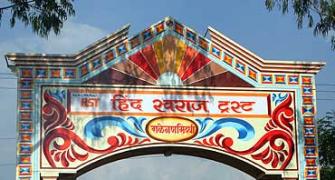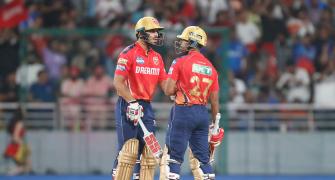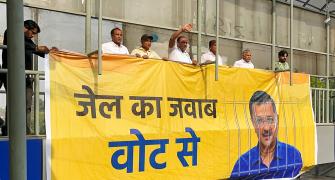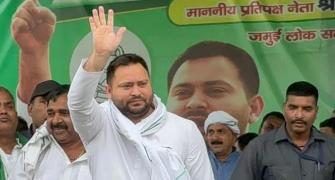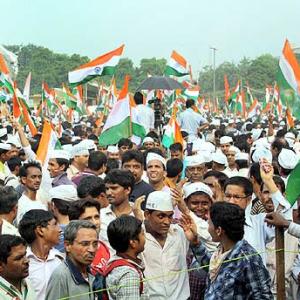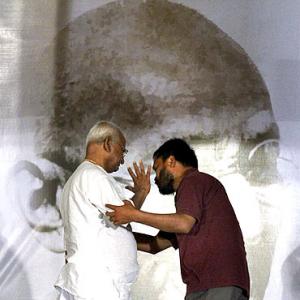The Indian establishment has finally got what it fully deserved; it is never known to react to reasoned debates and gentle persuasions. It understands only the language of coercion, terror and, of course, influence. Either it will coerce you or will get coerced by you, says M R Venkatesh.
Waiting at the ante-room a few years back for an appointment with a secretary to a ministry in the Government of India, I was witness to a peculiar conversation over the phone between his personal assistant and his counterpart -- a personal assistant to another secretary in a different ministry.
The gist of the animated discussions between the two was to figure out which of the two secretaries -- their respective bosses -- was the senior most. Some government diaries were consulted. Hectic parleys went on with some of their other colleagues. Facts and figures were checked and rechecked. I assumed that they were about to launch a spacecraft.
All this went on for a while I (im)patiently watched the drama unfold before me. Unable to bear the suspense any longer I gathered enough courage to ask the obvious question.
Despite being aghast at my impertinence and shocked at my complete lack of understanding about the functioning of government, he pointed out that the two secretaries had to discuss something of grave importance over phone. The question, believe or not, was, who had to come on line first and wait for the other to come next.
The 'protocol' among the government officers, the person explained, was for the junior officer to come on line first and wait for his senior in such situations. That explained the elaborate exercise carried out by the two personal assistants, lest the time honoured protocol be violated.
Indifference of the troika
The short point is very simple -- if this attitude (that has been legitimised as 'protocol' over the years) is displayed by the bureaucracy even when interacting within themselves, one can imagine what is in store when the aam aadmi attempts to interact with our bureaucracy.
The corridors of power are dominated by men with such grand delusions of self-importance who find it demeaning to wait on phone even for their colleague. Inexplicably they are called public servants.
When you approach them, they expect you to be on all fours. Should you resist, they may well deny even giving you an appointment. And should they meet you, they have nothing but contempt for you. And if they fail to deliver, you can do precious little. Yet, the system depends on them for deliverance.
If you thought that our bureaucracy is arrogant, let us not forget the insensitivity displayed by several of our elected representatives. Nothing demonstrates this attitude better than some of our MPs who were caught munching nuts at the all-party meet on the issue of the Lokpal Bill. Nevertheless, one must concede that they too have occupational hazards. At the height of Anna's fast they had to necessarily go to iftar parties to demonstrate their secular credentials too.
Call it arrogance, insensitivity or disconnect, the fact remains that the ruling elite comprising the three pillars of our Constitution in post-independence India are a law unto themselves. For 60-odd years they have given us bad laws, implemented it poorly and interpreted them badly.
Yet, no one can question them, critique them or point to the deficiency. Should you gather enough courage to question their functioning, you could be doing so at your own peril.
Yes, it is this troika -- in effect the ruling elite -- that has failed us completely since independence. When they failed us, the constitutional imperatives were forgotten. When it suited them, the Constitution itself was given short shrift. When they wanted, they rationalised everything including corruption.
Now that Anna Hazare wants a law passed by short-circuiting parliamentary procedures, the very same people are aghast that the constitutional provisions will be short-circuited! In short, constitutionalism degenerated from a sublime idea into a readymade excuse to stifle the genuine aspirations of Indians.
In the process do 'they' realise that post this agitation for Lokpal, 'they' have become less relevant in our democracy? Do 'they' realise that this spontaneous agitation seen in several parts of India is not for the Lokpal or for that matter against corruption, but a protest against the system that refuses to deliver for the common man?
Constitutionalism is dead
In short, Anna Hazare has moved the ground below their feet. From now on our MPs may be elected but they cannot claim to legitimately represent us any longer. Interestingly, political parties are refusing to see the writing on the wall.
Expectedly, the executive has withdrawn into a shell realising fully well that it is not in the immediate line of fire while the judiciary is making some attempts to redeem itself. Shortly, I expect, they too will be hauled over the coals by the people of this country.
Given these developments, the ruling combination continues to be in a state of extreme denial. It fails to realise that whenever spokesperson from the ruling combination -- mostly seasoned lawyers and experts in constitutional law -- open their mouths and talk of constitutionalism and rule of law, the ruling combination runs the risk of losing half a million votes.
Of course, this is counter-balanced by lawyers from the opposition who too put forward the same arguments of constitutionalism. This in a way ensures a 'balance of nonsense' among political parties.
The Dandi march, it may be recalled, was carried out by Mahatma Gandhi in the early thirties. Independence came a decade and a half later but the people of India had more or less mentally disengaged from the British at that point in time itself. The current situation is similar to the mood of the nation prevailing then.
No wonder, it is amusing to see our parliamentarians slugging it out whether the debate on Lokpal has to be carried out under Rule 184 or 193 in the Lok Sabha. Given the mood of the nation, the arguments put forth by the ruling as well as opposition combine on this issue looks extremely churlish.
Equally, it was amusing to see them discuss modalities for withdrawal of the Lokpal Bill originally tabled by the government as it was to see some ministers express their inability (citing, of course, the Constitution) of the Centre in legislating a similar law for states.
Hazare has exploited this paradigm completely. In the process, Hazare has irrevocably altered the grammar of our democracy. From now on more often than not, Parliament will be subservient to the goings-on at Ramlila.
Our parliamentarians have also failed to realise that legislating the Lokpal is incidental from now on. The more important issue is the fact that increasingly, people will realise that Hazare's fast has the calculated effect of robbing Parliament of its primacy if not its legitimacy.
I have been not been particularly enamoured about the Lokpal nor am I convinced about its efficacy. Similarly, I do not approve of the manner by which Team Anna has gone about ramming its version of Lokpal on Parliament.
On this matter, Congress general secretary Rahul Gandhi is spot on when he points out to the inherent fallacy contained in debating issues on the streets in a democracy. But he must also realise that it is his party and fellow parliamentarians who are to be blamed for the present imbroglio. If he does some soul-searching, he would definitely get the answers.
Should he do so, frankly he would agree that we had reached a situation where there is no alternative but to dynamite the existing system wherein rules prevailed not the results, form dominated not substance, constitutionalism triumphed not the people.
He would also realise that our elected representatives invariably cease to be our representatives once they get elected. On the contrary they become apologists and spokespersons for the Indian establishment.
Naturally, seen in its entirety the Indian establishment has finally got what it fully deserved; it is never known to react to reasoned debates and gentle persuasions. It understands only the language of coercion, terror and of course influence. Either it will coerce you or will get coerced by you.
Post-Independence we gave ourselves an extraordinary Constitution that was short-circuited by those very people who swore by it. The Constitution was to ensure that constitutionalism was the means and the people, the ends. But by making constitutionalism central to any debate, our constitutional experts have been denying all that was promised by the Constitution to the people!
The people in turn have retaliated by making constitutionalism and most of those who swore by constitutionalism irrelevant. In a democracy where people are supreme, constitutionalism surely has its limits.
M R Venkatesh is a Chennai-based chartered accountant. He can be reached at mrv@mrv.net.in

